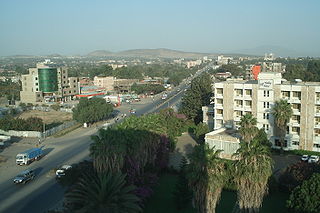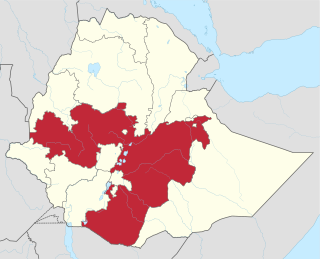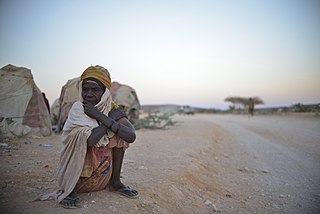
The politics of Ethiopia arise from the way the government of Ethiopia is structured as well as socioeconomic factors.

Many historians trace modern Ethiopia's foreign policy to the reign of Emperor Tewodros II, whose primary concerns were the security of Ethiopia's traditional borders, obtaining technology from Europe, and to a lesser degree Ethiopian rights to the monastery of Dar-es-Sultan in the city of Jerusalem. Tewodros' diplomatic efforts, however, ended disastrously with the British expedition of 1868 which concluded with his death. Despite the efforts of his successor Emperor Yohannes IV to establish a relationship with the United Kingdom, Ethiopia was ignored by the world powers until the opening of the Suez Canal, and more important, the Mahdist War, drew outside attention to her once more.

Dire Dawa is one of two chartered cities in Ethiopia. It is divided administratively into two woredas, the city proper and the non-urban woreda of Gurgura.

Adama, also known as Nazret or Nazreth, is a city in central Ethiopia and the previous capital of the Oromia Region. Adama forms a Special Zone of Oromia and is surrounded by Misraq Shewa Zone. It is located at 8.54°N 39.27°E at an elevation of 1712 meters, 99 km southeast of Addis Ababa. The city sits between the base of an escarpment to the west, and the Great Rift Valley to the east.

The Commercial Bank of Ethiopia (CBE) is the largest commercial bank in Ethiopia As of June 2015, it had about 303.6 billion Birr in assets and held approximately 67% of deposits and about 53% of all bank loans in the country. The bank has around 22,908 employees, who staff its headquarters and its over 1000+ branches positioned in the main cities and regional towns. The latter include 120 branches in the national capital Addis Ababa. With the opening of a branch in the Gechi in the Illubabor Zone of the Oromia Region, CBE's banking network has reached online 783 branches. The bank has reached 1284 branches as of August 10, 2018.

The Oromo Liberation Front is an organisation established in 1973 by Oromo nationalists to promote self-determination for the Oromo people against perceived Abyssinian colonial rule. The proponents of the movement hold that Amhara hegemony has been oppressing and suppressing the Oromo people and their culture. The movement is the culmination of over 70 years of uncoordinated resistance by Oromos against this condition. It has been outlawed and labelled a terrorist organisation by the Ethiopian government. The OLF has offices in Asmara, Washington, D.C. and Berlin from where it operates Amharic and Oromo-language radio stations.
Merera Gudina (Ph.D.) is a professor and politician in Ethiopia. He is the leader of the Oromo People's Congress (OPC), a political party representing the Oromo people. The organization is opposed to the ruling Ethiopian People's Revolutionary Democratic Front. He has been described as Ethiopia's "leading opposition politician".
Medrek መድረክ is an Ethiopian opposition political coalition founded in 2008 which contested the Ethiopian general election, 2010. In that election, Medrek won a single seat in the Council of People's Representatives, representing an electoral district in Addis Ababa. This was allegedly due to lack of election transparency. Medrek won 30% of the individual vote nationwide but it received only one seat in parliament because of Ethiopia's winner takes all system for each constituency.
The Relief Society of Tigray is an NGO based in Tigray, northern Ethiopia.REST was founded in 1978 as an organization providing relief efforts to civilians. As of 2008, Teklewoini Assefa served as Executive Director of REST. REST emerged as the humanitarian wing of the Tigray People's Liberation Front (TPLF) and has remained closely linked to TPLF. REST was active throughout the armed conflict of the 1980s, including during the devastating 1984-1985 famine.
The Mecha and Tulama Self-Help Association was an Oromo social movement in Ethiopia. The movement was primarily based in Bale, but was active in other regions as well. The organization committed acts of terrorism such as throwing a bomb at the coronation anniversary of emperor Haile Selassie and was banned in 1966, and some of its leaders were jailed or killed. The Association was established by Oromo nationalists like Mamo Mezemer, Haila Mariam Gemeda and Alemu Kitessa.

The Eritrean–Ethiopian border conflict was a violent standoff and a proxy conflict between Eritrea and Ethiopia, as part of the more general violence in the Horn of Africa. It consisted of a series of incidents along the then-disputed border; including the Eritrean–Ethiopian War of 1998–2000 and the subsequent Second Afar Insurgency. The border conflict was a continuation of the Eritrean–Ethiopian War of 1998–2000. It included multiple clashes with numerous casualties, including the Battle of Tsorona in 2016. Ethiopia stated in 2018 that it would cede Badme to Eritrea. This led to the Eritrea–Ethiopia summit on 9 July 2018, where an agreement was signed which demarcated the border and agreed a resumption of diplomatic relations.
A State of Emergency was declared on Sunday, October 9, 2016 by Ethiopian Prime Minister Hailemariam Desalegn, although the state of emergency reportedly took effect on Saturday, October 8, 2016. The state of emergency authorizes the military to enforce security nationwide. It also imposes restrictions on freedom of speech and access to information. Media have reported the state of emergency’s duration was announced for six months. The Constitution of Ethiopia provides for a six-month state of emergency under certain conditions. The government’s declaration of state of emergency followed massive protests by the Oromo and Amhara ethic groups against the government, which is controlled by people in the Tigrayan ethnic group, a smaller ethnic minority. It is the first time in approximately 25 years that a state of emergency has been declared in Ethiopia. In March 2017, Ethiopia’s parliament voted to extend the state of emergency for another four months.

The Oromo conflict was an armed conflict between the Oromo Liberation Front (OLF) and the Government of Ethiopia. The conflict began in 1973, when Oromo nationalists established the OLF and its armed wing, the Oromo Liberation Army (OLA).
The following lists events that happened during 2005 in Ethiopia.
The following lists events that happened during 2001 in Ethiopia.

Abiy Ahmed Ali is an Ethiopian politician serving as the 15th and current Prime Minister of Ethiopia since 2 April 2018. He is chairman of both the ruling EPRDF and the ODP, which are one of the four coalition parties of the EPRDF. Abiy is also an elected member of the Ethiopian parliament, and a member of the ODP and EPRDF executive committees.















